Becoming a mother & dealing with criticism
We got very philosophical today at Baby Thrive breastfeeding cafe. One mum shared (hopefully I am quoting accurately!)
“They forgot to tell you, when your baby was born you will meet a new person and that person will be you”
-beautiful!
Advice and information we get in the early days of breastfeeding can be hard to move on from, as our babies grow and move through new stages we need new tips and different information. Stuff that worked at the beginning may no longer suit and habits such as logging everything in apps and recording feeds gradually slip away over time.
Our discussions today reminded me of Maternal role acquisition theory* which states that new mothers go through stages ….early on parents often find themselves being quite binary, strict rules appeal as they try to get the hang of life with a newborn, relying on the advice of others in making decisions. The next theoretical stage is described as “The informal stage…when the mother develops her own methods of mothering… She finds what works for her and the child”, The final stage is described as “the mother experiences a sense of harmony, confidence, and competence in how she performs the role”-sounds great, but no pressure-most of us don’t get there fully!
There was mention today of how to follow your babies cues and trust your instincts, often in the face of unhelpful comments which can plant doubts.
Here is a really useful page (click here) on the subject with a list of suggested replies such as “I know it looks like hard work, but we’ve tried lots of ways and this is what we all enjoy most.” And sections on expressing your opinions and feelings and how to cope with feeling criticised.
So I will sign off by saying, just remember you are the best parent for your child.
Fancy joining the weekly support group in person? Details here.Sally
*Ramona Mercer's Maternal Role Attainment Theory (1984).

